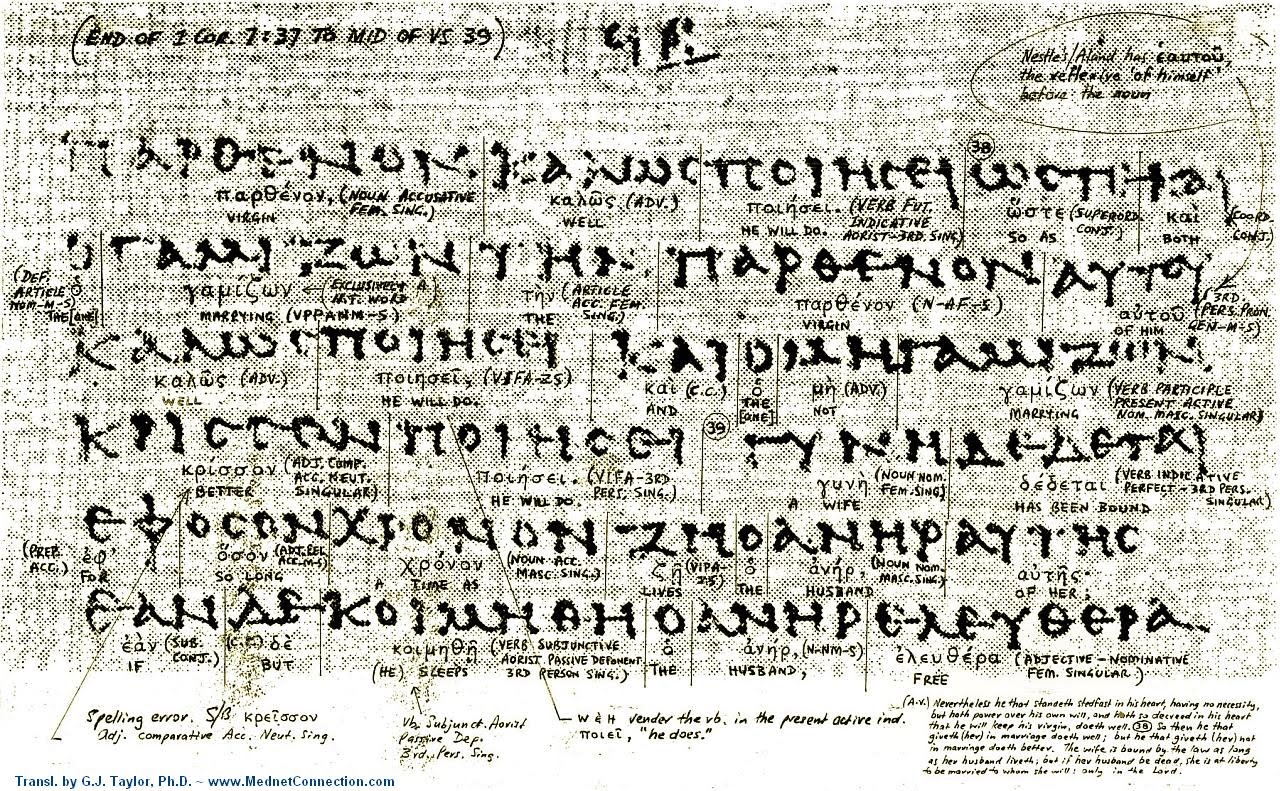For ages men have argued which version of the Bible is the most accurate.
The answer is unequivocally clear: The Greek New Testament and the
Septuagint (Old Testament in Greek, aka the "LXX," the Bible Jesus used).
What makes the Greek Bible superior to all others is the grammar. No other
tongue is able to express the writer's intent with such precision; for example,
the aorist tense (punctiliar past), Greek perfect (result of the action abides),
middle voice (subject participates in the result of the action on another).
Moreover the syntax sometimes speaks as loudly as the words.
Unfortunately, smoothing the Greek to facilitate readability in translation
may come at the price of right theology. For instance, in Luke 12:50, in the
Greek, Jesus states that His course to self-sacrifice on the cross and be
baptized by the sins of the world--past, present and future--is one wherein
He is sunechomai ('pressed from all sides with no alternative but to in one
direction'...to the cross). The Same proclaimed that "No man has a greater
love than this: to lay his life down for another."
In Gethsemane, which literally means 'oil press', Jesus the anointed was
severely pressed. He agonized over a decision that would forever
change the world. Fully human, He sought an alternative to subjecting His
purity to the filth of our sin. "Father, if there be another way, let this cup
[baptism of sin] pass. But also fully God, His divinity and love had the final
say. "But let thy will be done." Love never places self firstly."
The King James Version correctly translates sunechomai as "straitened,"
a nautical term, meaning compelled to travel on a narrow path, like a ship
through a strait. Other translations use such terms as "distressed" and
"troubled," where the meaning of Love being pressed to self-sacrifice for
others is entirely lost.
The answer is unequivocally clear: The Greek New Testament and the
Septuagint (Old Testament in Greek, aka the "LXX," the Bible Jesus used).
What makes the Greek Bible superior to all others is the grammar. No other
tongue is able to express the writer's intent with such precision; for example,
the aorist tense (punctiliar past), Greek perfect (result of the action abides),
middle voice (subject participates in the result of the action on another).
Moreover the syntax sometimes speaks as loudly as the words.
Unfortunately, smoothing the Greek to facilitate readability in translation
may come at the price of right theology. For instance, in Luke 12:50, in the
Greek, Jesus states that His course to self-sacrifice on the cross and be
baptized by the sins of the world--past, present and future--is one wherein
He is sunechomai ('pressed from all sides with no alternative but to in one
direction'...to the cross). The Same proclaimed that "No man has a greater
love than this: to lay his life down for another."
In Gethsemane, which literally means 'oil press', Jesus the anointed was
severely pressed. He agonized over a decision that would forever
change the world. Fully human, He sought an alternative to subjecting His
purity to the filth of our sin. "Father, if there be another way, let this cup
[baptism of sin] pass. But also fully God, His divinity and love had the final
say. "But let thy will be done." Love never places self firstly."
The King James Version correctly translates sunechomai as "straitened,"
a nautical term, meaning compelled to travel on a narrow path, like a ship
through a strait. Other translations use such terms as "distressed" and
"troubled," where the meaning of Love being pressed to self-sacrifice for
others is entirely lost.

No comments:
Post a Comment